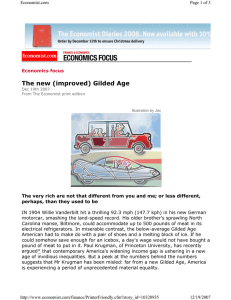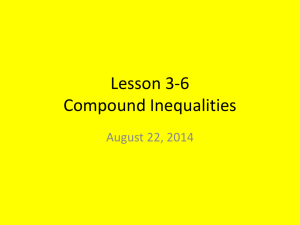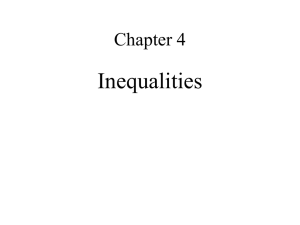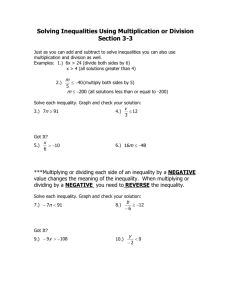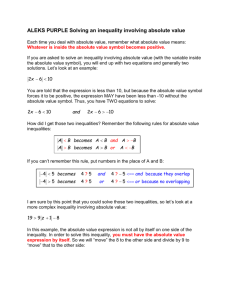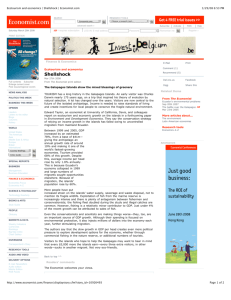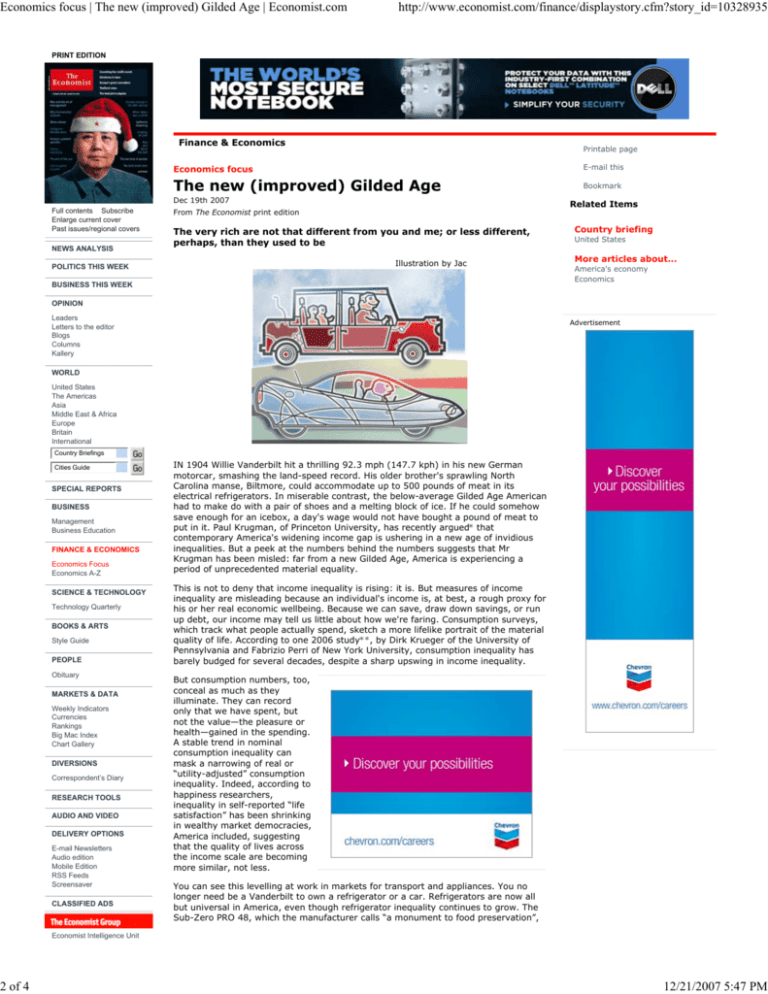
Economics focus | The new (improved) Gilded Age | Economist.com
2 of 4
http://www.economist.com/finance/displaystory.cfm?story_id=10328935
PRINT EDITION
Finance & Economics
Printable page
Economics focus
E-mail this
The new (improved) Gilded Age
Bookmark
Dec 19th 2007
Full contents Subscribe
Enlarge current cover
Past issues/regional covers
NEWS ANALYSIS
Related Items
From The Economist print edition
The very rich are not that different from you and me; or less different,
perhaps, than they used to be
Illustration by Jac
POLITICS THIS WEEK
BUSINESS THIS WEEK
Country briefing
United States
More articles about...
America's economy
Economics
OPINION
Leaders
Letters to the editor
Blogs
Columns
Kallery
Advertisement
WORLD
United States
The Americas
Asia
Middle East & Africa
Europe
Britain
International
Country Briefings
Cities Guide
SPECIAL REPORTS
BUSINESS
Management
Business Education
FINANCE & ECONOMICS
Economics Focus
Economics A-Z
SCIENCE & TECHNOLOGY
Technology Quarterly
BOOKS & ARTS
Style Guide
PEOPLE
Obituary
MARKETS & DATA
Weekly Indicators
Currencies
Rankings
Big Mac Index
Chart Gallery
DIVERSIONS
Correspondent’s Diary
RESEARCH TOOLS
AUDIO AND VIDEO
DELIVERY OPTIONS
E-mail Newsletters
Audio edition
Mobile Edition
RSS Feeds
Screensaver
CLASSIFIED ADS
IN 1904 Willie Vanderbilt hit a thrilling 92.3 mph (147.7 kph) in his new German
motorcar, smashing the land-speed record. His older brother's sprawling North
Carolina manse, Biltmore, could accommodate up to 500 pounds of meat in its
electrical refrigerators. In miserable contrast, the below-average Gilded Age American
had to make do with a pair of shoes and a melting block of ice. If he could somehow
save enough for an icebox, a day's wage would not have bought a pound of meat to
put in it. Paul Krugman, of Princeton University, has recently argued* that
contemporary America's widening income gap is ushering in a new age of invidious
inequalities. But a peek at the numbers behind the numbers suggests that Mr
Krugman has been misled: far from a new Gilded Age, America is experiencing a
period of unprecedented material equality.
This is not to deny that income inequality is rising: it is. But measures of income
inequality are misleading because an individual's income is, at best, a rough proxy for
his or her real economic wellbeing. Because we can save, draw down savings, or run
up debt, our income may tell us little about how we're faring. Consumption surveys,
which track what people actually spend, sketch a more lifelike portrait of the material
quality of life. According to one 2006 study**, by Dirk Krueger of the University of
Pennsylvania and Fabrizio Perri of New York University, consumption inequality has
barely budged for several decades, despite a sharp upswing in income inequality.
But consumption numbers, too,
conceal as much as they
illuminate. They can record
only that we have spent, but
not the value—the pleasure or
health—gained in the spending.
A stable trend in nominal
consumption inequality can
mask a narrowing of real or
“utility-adjusted” consumption
inequality. Indeed, according to
happiness researchers,
inequality in self-reported “life
satisfaction” has been shrinking
in wealthy market democracies,
America included, suggesting
that the quality of lives across
the income scale are becoming
more similar, not less.
You can see this levelling at work in markets for transport and appliances. You no
longer need be a Vanderbilt to own a refrigerator or a car. Refrigerators are now all
but universal in America, even though refrigerator inequality continues to grow. The
Sub-Zero PRO 48, which the manufacturer calls “a monument to food preservation”,
Economist Intelligence Unit
12/21/2007 5:47 PM
Economics focus | The new (improved) Gilded Age | Economist.com
3 of 4
http://www.economist.com/finance/displaystory.cfm?story_id=10328935
costs about $11,000, compared with a paltry $350 for the IKEA Energisk B18 W. The
Advertisement
lived
difference, however, is rather smaller than that between having fresh meat and
milk and having none. Similarly, more than 70% of Americans under the official
poverty line own at least one car. And the distance between driving a used Hyundai
Elantra and a new Jaguar XJ is well nigh undetectable compared with the difference
between motoring and hiking through the muck. The vast spread of prices often
distracts from a narrowing range of experience.
Economist Conferences
The World In
Intelligent Life
CFO
Roll Call
European Voice
EuroFinance
Economist Diaries and
Business Gifts
Reprints and Permissions
Save money. Live better
This compression is not a thing of the past. To take one recent example, Jerry
Hausman of the Massachusetts Institute of Technology and Ephraim Leibtag of the
United States Department of Agriculture, show† that Wal-Mart's move into the
grocery business has lowered food prices. Because the poorest spend the largest part
of their budget on food, lower prices have benefited them most. The official statistics
do not capture these gains.
Advertisement
As a rule, when the prices of food, clothing and basic modern conveniences drop
relative to the price of luxury goods, real consumption inequality drops. But the point
is not that in America the relatively poor suffer no painful indignities, which would be
absurd. It is that, over time, the everyday experience of consumption among the less
fortunate has become in many ways more similar to that of their wealthier
compatriots. A widescreen plasma television is lovely, but you do not need one to
laugh at “Shrek”.
This compression is the predictable consequence of innovations in production and
distribution that have improved the quality of goods at the lower range of prices
faster than at the top. New technologies and knock-off fashions now spread down the
price scale too fast to distinguish the rich from the aspiring for long.
This increasing equality in real consumption mirrors a dramatic narrowing of other
inequalities between rich and poor, such as the inequalities in height, life expectancy
and leisure. William Robert Fogel, a Nobel prize-winning economic historian, argues††
that nominal measures of economic well-being often miss such huge changes in the
conditions of life. “In every measure that we have bearing on the standard of
living...the gains of the lower classes have been far greater than those experienced
by the population as a whole,” Mr Fogel observes.
Some worrying inequalities, such as the access to a good education, may indeed be
widening, arresting economic mobility for the least fortunate and exacerbating
income-inequality trends. Yet even if you care about those aspects of income
inequality, the idea can send misleading signals about the underlying trends in real
consumption and the real quality of life. Contrary to Mr Krugman's implications,
today's Gilded Age income gaps do not imply Gilded Age lifestyle gaps. On the
contrary, those intrepid souls who make vast fortunes turning out ever higher-quality
goods at ever lower prices widen the income gap while reducing the differences that
matter most.
*“The Conscience of a Liberal” by Paul Krugman. W.W. Norton, 2007.
**“Does Income Inequality Lead to Consumption Inequality? Evidence and Theory” by Dirk Krueger
and Fabrizio Perri. Review of Economic Studies, 2006.
†“Consumer Benefits from Increased Competition in Shopping Outlets: Measuring the Effect of
Wal-Mart” by Jerry Hausman and Ephraim Leibtag. Journal of Applied Econometrics, forthcoming.
††“The Escape from Hunger and Premature Death, 1700-2100” by Robert William Fogel. Cambridge
University Press, 2004.
Back to top »
Classified ads
Jobs
Director of Programs
- Mebendazole
Donation Initiative
(3331BR)
Director of Programs
- Mebendazole
Donation ....
Sponsors' feature
Business /
Consumer
A Franchise to be
proud of - WSI. Own
the #1 Internet
Marketing Franchise
for $49,700 US. Full
Training and Support.
Apply Today.
Tenders
Jobs
Appel à Candidature
APPEL A
CANDIDATURE Le
Gouvernement
Gabonais a bénéficié
de financements de
la Ban....
Associate Editor
(Financial Editor)
Associate Editor
(Financial Editing and
Market Research)
DIVISION:
Research/Fina....
Business /
Consumer
Apply Today - WSI is
the world's largest
network of
professional Internet
Marketing
Consultants. Full
Training and Support.
About sponsorship »
Tenders
Notices for
Expressions of
Interest
DEMOCRATIC
REPUBLIC OF
CONGO BUREAU
CENTRAL DE
COORDINATION
(B....
About Economist.com | About The Economist | Media Directory | Staff Books | Advertising info | Career opportunities | Contact us
Copyright © The Economist Newspaper Limited 2007. All rights reserved. Advertising Info | Legal disclaimer | Accessibility | Privacy policy | Terms & Conditions | Help
12/21/2007 5:47 PM

